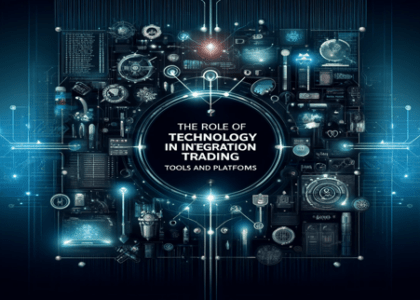As the financial markets evolve, integration trading is at the forefront of transformative changes driven by technological advancements and shifting market dynamics. This blog post explores emerging trends and innovations shaping the future of integration trading. We will delve into cutting-edge technologies like blockchain, cloud computing, and big data analytics and discuss the implications of evolving market trends such as ESG investing. Finally, we’ll speculate on future developments, including the rise of decentralized finance (DeFi) and the integration of artificial intelligence (AI) into trading algorithms.
Technological Advancements Shaping Integration Trading
Blockchain Technology
Blockchain technology revolutionises integration trading by enhancing transparency, security, and efficiency. Decentralized ledgers allow for immutable transaction records, reducing the risk of fraud and enabling real-time settlement. This innovation is particularly impactful in cross-border trading, where blockchain can streamline processes and reduce costs.
Impact on Trading Strategies:
- Smart Contracts: Automate and enforce trading agreements, reducing the need for intermediaries.
- Tokenization: Allows the trade of fractional shares and assets, increasing market liquidity.
Cloud Computing
Cloud computing is transforming the infrastructure of integration trading by providing scalable and flexible solutions for data storage and processing. Cloud platforms enable traders to access vast amounts of data and computational power on demand, facilitating more sophisticated trading strategies.
Impact on Trading Strategies:
- Scalability: Seamlessly scale operations without significant capital expenditure.
- Collaboration: Enhance collaboration among global trading teams with real-time data access and analysis.
Big Data Analytics
Big data analytics is crucial in integration trading, providing insights that drive informed decision-making. By analyzing vast datasets, traders can identify patterns, trends, and correlations that traditional analysis might miss. This leads to more accurate market predictions and optimized trading strategies.
Impact on Trading Strategies:
- Predictive Analytics: Forecast market movements and trends with higher accuracy.
- Sentiment Analysis: Gauge market sentiment by analyzing news, social media, and other data sources.
Evolving Market Trends and Their Implications
Rise of ESG Investing
Environmental, Social, and Governance (ESG) investing is gaining traction as investors increasingly prioritize ethical and sustainable practices. ESG factors are becoming integral to investment decisions, influencing market behaviour and trading strategies.
Implications for Integration Trading:
- Data Integration: Incorporate ESG metrics into trading models to align with investor preferences.
- Risk Management: Assess and mitigate risks related to environmental and social factors.
Proliferation of Decentralized Finance (DeFi)
DeFi represents a shift towards decentralized financial systems built on blockchain technology. DeFi platforms offer innovative financial services, including lending, borrowing, and trading, without traditional intermediaries.
Implications for Integration Trading:
- New Asset Classes: Access to a broader range of assets and financial instruments.
- Liquidity Pools: Utilize decentralized liquidity pools for efficient trade execution.
Future Developments in Integration Trading
Integration of Artificial Intelligence
Artificial Intelligence (AI) is set to revolutionize integration trading by enhancing algorithmic trading strategies. AI algorithms can analyze complex datasets, learn from historical data, and adapt to market conditions in real-time.
Potential Innovations:
- Algorithmic Trading: Develop sophisticated algorithms that can execute trades precisely and quickly.
- Automated Decision-Making: Implement AI-driven decision-making processes for optimized trading outcomes.
Expansion of Quantitative Trading
Quantitative trading, which relies on mathematical models and algorithms, is expected to expand further. Integrating AI and big data analytics will enable more advanced quantitative strategies, improving trading performance.
Potential Innovations:
- High-Frequency Trading: Increase the use of high-frequency trading algorithms for rapid market responses.
- Portfolio Optimization: Utilize advanced models to optimize portfolios based on various factors, including market conditions and investor preferences.
Enhanced Data Privacy and Security
As data becomes increasingly valuable, ensuring its privacy and security is paramount. Future developments in integration trading will likely focus on enhancing data protection measures to comply with regulations and protect sensitive information.
Potential Innovations:
- Secure Data Sharing: Implement secure protocols for sharing data across platforms.
- Regulatory Compliance: Develop technologies that ensure compliance with evolving data privacy regulations.
Conclusion
The future of integration trading is poised for significant transformation driven by technological advancements and evolving market trends. Innovations like blockchain, cloud computing, and big data analytics are reshaping trading strategies and market dynamics. The rise of ESG investing and the proliferation of DeFi are introducing new dimensions to integration trading, requiring traders to adapt and innovate continually. Looking ahead, integrating AI into trading algorithms and expanding quantitative trading will further revolutionize the industry, offering unprecedented opportunities for growth and efficiency.
By staying ahead of these trends and embracing innovations, traders can navigate the complexities of the modern financial landscape and achieve long-term success in integration trading.






